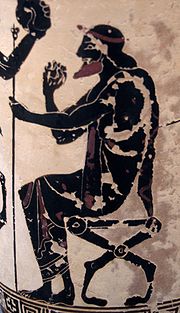Œnée
- Œnée
-
 Pour l
Pour l’
article homophone,
voir Eunée.
Dans la mythologie grecque, Œnée (en grec ancien Οἰνεύς / Oineús), fils de Porthaon et d'Euryté, est roi de Calydon.
Dans sa vieillesse, il fut détrôné par les enfants de son frère Agrios et rétabli par son petit-fils Diomède ; mais il abandonna volontairement l'administration de son État à son gendre Andrémon et se retira à Argos, où Diomède lui rendit de grands honneurs. On dit qu'Œnée, visité par Dionysos, permit à ce dieu d'avoir un commerce intime avec Althée, sa femme, et que Dionysos lui permit, en récompense, de donner son nom au vin. En effet, le nom du vin, en grec, est οἶνοσ / oinos.
Sa femme lui donne plusieurs enfants, dont Déjanire, Tydée, Straphylos, Toxée, Polyxo, Autonoé, Eurymédé, et Mélanippe.
Source
Sur les autres projets Wikimedia :
Catégories : - Roi de la mythologie grecque
- Mythologie grecque d'Étolie
Wikimedia Foundation.
2010.
Contenu soumis à la licence CC-BY-SA. Source : Article Œnée de Wikipédia en français (auteurs)
Regardez d'autres dictionnaires:
née — née … Dictionnaire des rimes
Nee — may refer to: * Née or Nee, indicating a maiden name * NEE, a political party in Flanders, Belgium * Ne e? , a 2003 single by Aya MatsuuraPeople with the family name* Luis Née (fl. 1789 1794), a Franco Spanish botanistee also*Ni (disambiguation)… … Wikipedia
née — née, né Née is the feminine form of the French adjective meaning ‘born’ and is traditionally used to identify the maiden name of a married woman: Mrs Ann Smith, née Jones. In other cases it is used to denote the original name of a woman who has… … Modern English usage
née — [neı] [Date: 1700 1800; : French; Origin: , feminine form of né born ] used to say what a married woman s family name was when she was born. Née is put after her married name and before her old name →↑maiden name ▪ Mrs Elizabeth Davis, née… … Dictionary of contemporary English
nee — or née [nā; nē] adj. [Fr, fem. of né, pp. of naître < L nasci, to be born: see GENUS] born: used to indicate the maiden name of a married woman [Mrs. Helen Jones, née Smith] … English World dictionary
Nee — (n[asl]), p. p., fem. [F., fr. L. nata, fem. of natus, p. p. of nasci to be born. See {Nation}.] Born; a term sometimes used in introducing the name of the family to which a married woman belongs by birth (i.e. her maiden name); as, Madame de… … The Collaborative International Dictionary of English
nee — introducing the maiden name of a married woman, 1758, from Fr. née, fem. pp. of naître born, from L. natus, pp. of nasci to be born (Old L. gnasci; see GENUS (Cf. genus)) … Etymology dictionary
née — ► ADJECTIVE (masc. né) ▪ born (used in citing a person s former name, especially a married woman s maiden name): Mrs. Hargreaves, née Liddell. ORIGIN French … English terms dictionary
nee — фр. (нэ) урожденная (указывается перед девичьей фамилией во многих странах мира). Толковый словарь иностранных слов Л. П. Крысина. М: Русский язык, 1998 … Словарь иностранных слов русского языка
nee — (Fr.) Word used to show maiden family name of a married woman. Short Dictionary of (mostly American) Legal Terms and Abbreviations … Law dictionary
nee — ↑ne1 … Langenscheidt Großwörterbuch Deutsch als Fremdsprache
 Œnée trônant, lécythe attique à fond blanc, v. 500 av. J.-C., Staatliche Antikensammlungen de Munich (Inv. 1905)
Œnée trônant, lécythe attique à fond blanc, v. 500 av. J.-C., Staatliche Antikensammlungen de Munich (Inv. 1905)
